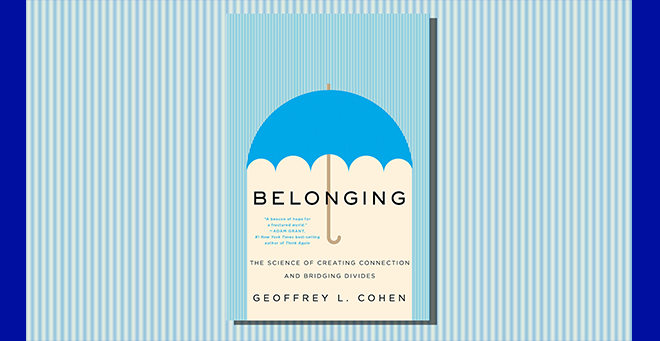
The Diversity and Inclusion Office at UMass Chan Medical School is hosting its 2023 Diversity Campus Read, featuring Belonging: The Science of Creating Connection and Bridging Divides, by Geoffrey L. Cohen. The Diversity and Inclusion Office has purchased hard copies and electronic copies of the book through Barnes & Noble. Email Holly Brown at Diversity@umassmed.edu to access a digital copy. The Lamar Soutter Library will have copies to check out.
Two discussion groups led by members of the Diversity and Inclusion Office will be held: one launches the Campus Read on Jan. 9, and the second, on a date to be determined, culminates the Campus Read with a discussion about lessons learned and methods for applying the principles of creating authentic connection. Members of the campus community are encouraged to get together departmentally, interdepartmentally, with class groups and learning communities to read. The Lamar Soutter Library has resources for engaging in meaningful conversation about the book.
About the book
It goes without saying that our world is deeply troubled by our inability to see beyond what separates us from each other. We define ourselves by difference rather than by what can unite us across political, social or cultural divides. Cohen’s book Belonging utilizes his extensive research in the area of social psychology to craft this seminal text. Belonging explores concepts such as situation crafting, thoughtful listening and applying what he refers to as “wise interventions” to shift our perceptions of difference to work toward improved academic, social and health equity. Cohen is not offering a quick fix or a “one and done” solution. Rather, we are asked to “craft situations” that, through small and intentional actions, result in perceptible shifts in our sense of belonging, purpose and ability to influence our own realities.
In viewing situations through the lens of a common purpose, Cohen urges us to utilize our lived experiences to help facilitate belonging through the lens of curiosity and openness. Rather than ignore or harshly judge our own internal biases or negative assumptions, the author implores us to recognize how shifts in our thinking, along with the recognition of the influence of systemic inequalities, can result in positive shifts toward a more inclusive world. Cohen believes we are all capable of growth—a key theme throughout Belonging—and that this will be our salvation as a global community. By recognizing the part each of us play in shaping our environments and our experiences within them, the author believes we imbue ourselves with the power to combat what fractures our sense of belonging, our personal value and our ability to connect with diverse individuals. In essence, what the individual perceives about a situation or person is more powerful and more changeable than we think, Cohen says. Common ground is fertile soil for change.
Melissa Augustine is the educational and clinical services and diversity, equity and inclusion librarian at the Lamar Soutter Library at UMass Chan Medical School.